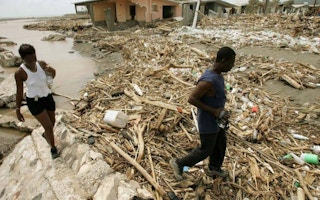From higher shipping costs for solar panels to employee layoffs, a plethora of pandemic-related ills have hindered efforts to fight climate change in the Caribbean nation of Grenada. And it is not alone.
Across the world, Covid-19 has hit economic growth and tax revenue, making it harder for governments - particularly in developing nations - to meet their targets on cutting carbon emissions and adapting to climate change.
“Covid has definitely had a negative impact,” said Trevor Thompson, Grenada’s acting chief agriculture officer and a member of the country’s National Climate Change Committee.
Even the lack of face-to-face meetings has contributed to the slowdown.
“Virtual meetings could only accomplish so much,” he said.
Scientists warn the world has less than a decade left to slash its still-rising emissions by nearly half, or the most ambitious goals of the Paris Agreement - aimed at keeping people and nature safe from accelerating warming - will be lost.
Similarly, the need to adapt to worsening climate impacts - from floods and sea level rise to droughts, storms and wildfires - is becoming urgent, scientists warned last month.
As the planet heats, “losses and damages increase and become increasingly difficult to avoid” and will be “strongly concentrated among the poorest vulnerable populations”, the Intergovernmental Panel on Climate Change (IPCC) said.
But rising costs and shrinking budgets have hampered progress on Paris Agreement goals in many of the nations at highest risk from extreme weather and rising seas.
In Indonesia, the government budget for climate action fell 20 per cent in 2020 from the previous year, while Fiji cut climate funding by 40 per cent, according to the World Resources Institute (WRI), a research nonprofit.
Fiji’s reduction came even as tropical Cyclone Yasa slammed the Pacific island nation, causing some $250 million in damages, WRI said.
‘On the backburner’
Grenada aims to spend more than $1 billion by 2035 to reach its climate goals, which include a 40 per cent reduction in its greenhouse gas emissions by 2030.
Implementation of these efforts has been delayed by up to a year due to the pandemic, with costs rising 35 per cent, Thompson said.
In nearby Jamaica, plans to procure electric buses, install solar panels at schools and plant 3 million trees have also been set back, as capital budgets shrank and pandemic restrictions kept people at home.
Jamaica is aiming for a 25 per cent reduction in emissions by 2030, but has not yet fully detailed the associated costs.
Matthew Samuda, a Jamaican minister for economic growth and job creation, who works on climate action, said the two-year pandemic had taken a toll on their climate efforts.
“All projects right across (the) public and private sector have been impacted,” he said.
For many nations trying to meet their Paris targets, “the implementation timeframe now is a lot smaller”, said Pablo Vieira of the NDC Partnership, a coalition that helps developing countries with their climate change plans.
Some nations updated their aims with more ambitious targets at last year’s COP26 talks in Glasgow, giving them little time to fulfil them, particularly as the pandemic drags on, he said.
“(Economic) recovery might take another three, four or five years, which means climate action will most likely be put on the backburner,” he said.
In addition to the slowdown in climate action, the declines in greenhouse gas emissions seen at the height of global lockdowns have disappeared as economies steadily rebound, climate analysts say.
Crippling
The latest synthesis report by the UN climate secretariat of countries’ climate action plans - or “nationally determined contributions” (NDCs) - found most nations “have not reflected the potential impacts of the pandemic in their NDCs”.
Across sub-Saharan Africa, rising debt associated with efforts to battle Covid-19 and economic slowdowns has been a brake on climate action.
In Africa, some countries are now spending up to 30 per cent of their income servicing debt, said Sejal Patel, an environmental economist with the London-based International Institute for Environment and Development.
“It can be crippling,” she said, noting that the pandemic had also forced governments to hike spending on welfare, healthcare and education.
Samuda, of Jamaica, said his country was not alone in seeing the pandemic as at least a temporary dampener on its push for climate action.
“That disruption would obviously hurt any developing country, and Jamaica wasn’t immune,” he said.
This story was published with permission from Thomson Reuters Foundation, the charitable arm of Thomson Reuters, that covers humanitarian news, climate change, resilience, women’s rights, trafficking and property rights. Visit http://news.trust.org/climate.










